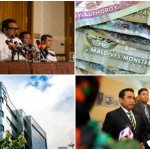A delegation from the International Monetary Fund (IMF) expressed surprise at the “resilience” of the Maldivian economy in a meeting with MPs on the parliament’s public finance committee yesterday.
Dr Koshy Mathai, resident representative to Sri Lanka and Maldives, told MPs that the IMF was surprised that the economy has stayed afloat for years despite longstanding fiscal imbalances.
“For a long time we’ve been saying that reserves at the MMA [Maldives Monetary Authority] are very low and that the fiscal deficit is quite difficult and we expect the economy to run into some problems. But somehow the economy has shown resilience, a lot of resilience, and we’ve been surprised – happily surprised but surprised nonetheless,” he said.
The IMF was interested in “carefully studying” how the domestic economy has remained resilient in the face of soaring public debt and persisting budget deficits, Mathai said.
“Imports are on the shelf. If you go into a shop, you’ll find a wide range of imported goods there. You see people with motor scooters and cars and smartphones. You see people going on travel. All these are available, are done, even while the level of reserves at the MMA is quite low,” he observed.
In attendance at yesterday’s meeting were the committee’s chair, MP Abdulla Jabir, and MPs Abdul Ghafoor Moosa and Mohamed ‘Colonel’ Nasheed.
As the IMF delegation currently in the Maldives was on “fact-finding” or “exploratory mode” ahead of the organisation’s article IV consultation later this year, Mathai told the MPs that the team did not have “comprehensive policy recommendations” to share.
Fiscal consolidation
“One area where we have more clear ideas is an area where we’ve had discussions in the past, and that’s the need for fiscal consolidation,” Mathai continued.
Noting that “fiscal problems have been at the root of so many crises” in countries large and small, Mathai said that the the Maldives had “a government budget envelop that is very difficult to finance.”
“The deficit is quite large. Financing is difficult to find. Banks are not that willing to subscribe to treasury bills. We see treasury bill yields rising quite sharply. MMA external financing is difficult to mobilise as you all know. We’re left then with MMA printing money in order to finance expenditures,” he explained.
A second option was “running up arrears, unpaid bills to domestic suppliers,” he added.
Both methods posed serious challenges, Mathai continued, as the government’s failure to pay its bills “creates ripples effects throughout the entire economy.”
Moreover, printing money to finance deficit spending “puts a lot of pressure on prices” and central bank reserves, he said.
“Because in a small country like the Maldives, when the MMA prints money, that is an injection of purchasing power into the economy, it means more people can import things,” Mathai said.
Printing money therefore “creates increased demand for dollars, increased imports, pressure on reserves,” he noted.
“As I said, the system seems to work. The parallel market somehow is letting the economy work,” he observed.
Solutions
As new sources of financing the budget were not available in the short-term, Mathai suggested targeting subsidies to the poor and increasing tourism taxes.
“The electricity subsidy is one that goes to even the richest strata of society. Basic food subsidies are being enjoyed now by the resorts, and never mind the resorts, are being enjoyed by wealthy foreign visitors who stay at the resorts. That to us seems like a totally unnecessary policy,” he said.
He added that “substantial savings” could be made from the budget by targeting subsidies to those most in need of assistance.
Mathai also argued that the rates of taxation in the tourism sector were “quite low” compared to other tourist destinations.
Mathai said he paid “north of 20 percent” in taxes at a hotel in Fiji while the Tourism Goods and Services Tax (T-GST) in the Maldives was only recently raised to 12 percent.
It would not be “a tax on business” that would slow down the economy, Mathai added.
“Rather it is saying people are coming and enjoying all that the Maldives has to offer, so let them pay something for it,” he said.
As 70 to 80 percent of the Maldivian economy was “driven by tourism,” Mathai said that it was “only natural that the [tourism industry is] contributing resources for the economy to operate.”
He added that “rates of return on Maldivian resorts are among the highest in the world” with profitable payback periods.
However, compared to other tourism-dependent economies, Mathai said that government expenditure in the Maldives was comparatively “very high” due to the geographic dispersion of the population and the large public sector wage bill.
In the medium-term, Mathai recommended taking measures to reform the civil service, improve delivery of public services and increase efficiency by economising.
“Ultimately we need to do a structural adjustment to the budget so that it’s more sustainable,” he concluded.






Is this IMF guy suitable as a taxi driver in Male? Probably not. Because every Maldivain and who watch TV knows that big tourism destinations (Egypt, Thailand etc.. ) and in chaos and all tourists are comming to Maldives.
What the IMF guy does not comprehend is that Maldives is 100 booked most of this year.
And he is surprised.. wonder how he got a job in the IMF in the first..
Mister IMF doesn't know why the Mordisian economy is so resilient. It's because Yaantey backstabbed the Afghan Mafia and became the region's largest heroin user and distributor.
That's right; this so-called 100% muslim country is funded with drug money.